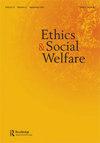Advocacy as a Human Rights Enabler for Parents in the Child Protection System
IF 0.9
Q4 SOCIAL WORK
引用次数: 0
Abstract
ABSTRACT Parents and guardians in child protection systems are in unequal power relationships with child protection practitioners. This relationship is experienced as exclusionary or even oppressive by many parents and guardians. For families and communities in the child protection system who experience intersectional discrimination and disadvantage, such as people with intellectual disabilities and First Nations people, this unequal relationship and subsequent potential exclusion and oppression can be even more profound. A growing body of literature indicates that advocacy can assist in addressing unequal relationships in other contexts, such as involuntary mental health. This paper explores the role of representational advocacy in supporting parents in child protection settings through a case study of an advocacy service in Victoria, Australia. Using a human rights framework to guide the analysis, the paper highlights how advocacy can help support rights, but that broader structural change will be required to consistently uphold the rights of parents.在儿童保护制度中倡导父母的人权
儿童保护系统中的父母和监护人与儿童保护从业人员处于不平等的权力关系中。这种关系对许多父母和监护人来说是排他性的,甚至是压迫性的。对于在儿童保护系统中遭受交叉歧视和不利处境的家庭和社区,例如智障人士和原住民,这种不平等关系以及随之而来的潜在排斥和压迫可能更为深刻。越来越多的文献表明,倡导可以帮助解决其他情况下的不平等关系,例如非自愿心理健康。本文通过对澳大利亚维多利亚州一项倡导服务的案例研究,探讨了代表性倡导在儿童保护环境中支持父母的作用。该报告使用人权框架来指导分析,强调宣传如何有助于支持权利,但需要更广泛的结构变革来始终维护父母的权利。
本文章由计算机程序翻译,如有差异,请以英文原文为准。
求助全文
约1分钟内获得全文
求助全文
来源期刊

Ethics and Social Welfare
SOCIAL WORK-
CiteScore
1.60
自引率
20.00%
发文量
36
期刊介绍:
Ethics and Social Welfare publishes articles of a critical and reflective nature concerned with the ethical issues surrounding social welfare practice and policy. It has a particular focus on social work (including practice with individuals, families and small groups), social care, youth and community work and related professions. The aim of the journal is to encourage dialogue and debate across social, intercultural and international boundaries on the serious ethical issues relating to professional interventions into social life. Through this we hope to contribute towards deepening understandings and further ethical practice in the field of social welfare. The journal welcomes material in a variety of formats, including high quality peer-reviewed academic papers, reflections, debates and commentaries on policy and practice, book reviews and review articles. We actively encourage a diverse range of contributions from academic and field practitioners, voluntary workers, service users, carers and people bringing the perspectives of oppressed groups. Contributions might include reports on research studies on the influence of values and ethics in social welfare practice, education and organisational structures, theoretical papers discussing the evolution of social welfare values and ethics, linked to contemporary philosophical, social and ethical thought, accounts of ethical issues, problems and dilemmas in practice, and reflections on the ethics and values of policy and organisational development. The journal aims for the highest standards in its published material. All material submitted to the journal is subject to a process of assessment and evaluation through the Editors and through peer review.
 求助内容:
求助内容: 应助结果提醒方式:
应助结果提醒方式:


